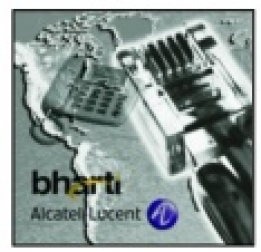Paying Partnership - Bharti Airtel, Alcatel-Lucent form JV

-
Expanding on its tested strategy of outsourcing, Bharti Airtel has engaged Alcatel Lucent, the world's leading manufacturer of fixed line phone equipment, to expand and manage its fixed line and broadband business. The two companies have signed a five-year managed services partnership agreement that will include end-to-end activities such as service rollout, installation and fault repair, and service continuity as well as services such as high speed internet and video conferencing.
The $500 million deal will see the creation of a joint venture (JV) entity in which Alcatel-Lucent will hold 76 per cent equity and Bharti Airtel the rest. AlcatelLucent will run the JV, and while Airtel will not transfer any of its material assets to the JV, the bulk of the 4,000 staffers will come from it. The subscribers and their revenues will also be on Airtel's books.
Bharti Airtel has in the past too contracted out certain business aspects to "experts" so that it can concentrate on its key strengths. It has, in fact, made outsourcing its key strategy over the past several years. The company has signed billion-dollar contracts with network vendors such as Ericsson, Nokia Siemens Networks to manage, build and operate its mobile network. It has awarded IBM a 10year, $750 million contract, the scope of which is now worth $2.5 billion.
Still, even for Bharti, the AlcatelLucent deal is the first JV signed for managing its core service. This is perhaps because of the complicated nature of the fixed line and broadband business compared with mobile telephony. "Unlike the wireless business where you have to just put in a passive network and subscribers roll in, in the broadband business, you have to go to consumers' homes to install the equipment and explain how it works, and that requires a lot more engagement. For such a business, we thought a JV would be a more effective structure," notes Manoj Kohli, CEO and joint managing director of Bharti Airtel.
The company has nearly 94 million mobile users as of March 2009, accounting for 24 per cent share of the mobile market. It has over 2.7 million landline and broadband subscribers in 95 cities. In the quarter ended March 2009, the telemedia business (including fixed line and broadband) contributed nearly 9 per cent to the total earnings. The average revenue per user, at Rs 1,071 per month, is also three times higher than that for its mobile users.
It, therefore, makes sense to contract this business to Alcatel-Lucent, which has successfully transformed fixed line networks to internet protocol, next-generation network-enabled ones in about 40 countries. "This is the type of support we want in order to accelerate performance as we migrate to next-generation networks for our broadband and telephone customers," says Kohli.
By thus leveraging Alcatel-Lucent's global expertise in IP transformation and network management, Airtel can focus on customer delivery and market growth as the JV will not only help in saving costs, but will also help Airtel scale up the numbers from the current 3 million broadband customers and fixed line users.
For Alcatel-Lucent, this is the second India deal. In 2008, it signed a 70:30 JV agreement with Reliance Communications for managed services for CDMA and GSM networks. The five-year contract is worth $500 million.
Clearly, such partnerships are mutually beneficial and seem to be the way forward. Noted Ben Verwaayen, CEO of Alcatel-Lucent, while announcing the Airtel deal, "We appreciate the opportunity Bharti Airtel has given us to demonstrate our worldwide expertise in network transformation, managed network services and IP transformation."
- Most Viewed
- Most Rated
- Most Shared
- Related Articles
- Manufacturing Hub: India emerges as a ke...
- TRAI performance indicator report for Se...
- Prashant Singhal, partner, telecom indus...
- 2G spectrum scam: continuing controversy
- An Eventful Year: Telecom highlights of ...
- Telecom Round Table: TRAI’s spectrum p...
- Manufacturing Hub: TRAI recommends indig...
- Linking Up: ITIL to merge with Ascend
- High Speed VAS - Killer applications w...
- Bharti Airtel seals deal with Zain - Zai...






